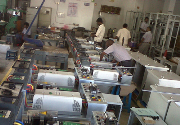 The installation of 28 RIS.GA systems from Control Techniques on rubber tyred gantry cranes (RTGs) and mobile harbour cranes (MHCs) at a Sri Lankan port is producing significant savings of diesel fuel, giving a rapid return on investment of under two years at today’s fuel prices.
The installation of 28 RIS.GA systems from Control Techniques on rubber tyred gantry cranes (RTGs) and mobile harbour cranes (MHCs) at a Sri Lankan port is producing significant savings of diesel fuel, giving a rapid return on investment of under two years at today’s fuel prices.
The port, owned by South Asia Gateway Terminals Ltd, and better known as SAGT, is one of the world’s largest and, last year, hit a record throughput of 1.96 million TEUs (twenty foot equivalent units).
The terminal is located in the port of Colombo at historic Queen Elizabeth Quay. The port’s natural geographic location is strategically positioned on the main East-West shipping route, linking the Far East with Africa, Europe, and the East Coast of the US, providing ideal connections to the trade in the Indian sub-continent – making the port of Colombo a strategic hub.
As part of SAGT’s constant striving to improve its health, safety and environmental management systems, the company looked at methods for reducing fuel usage within the port and focussed on crane diesel usage.
In April 2012, with the help of Control Techniques India, SAGT ran a pilot project to evaluate the fuel saving potential of Emerson Control Techniques’ RIS.GA system. The results surpassed expectations and an order was immediately placed for RIS.GA systems to be installed on all its RTGs and MHCs – 28 systems in total.
With the RIS.GA compact fuel saving system installed on its cranes, SAGT is able to reduce the idle engine speed by up to 40% and achieves a direct fuel saving without any interruption during changeover from operations mode to idle mode. During idle time RIS.GA supplies the cranes’ auxiliary devices.
As a result, SAGT has reduced the total fuel consumption by 22% with minimum modification to the present systems. The resulting ROI is less than two years. SAGT is supported by Control Techniques’ local technical service to ensure that systems perform to their optimum level.
As well as reducing fuel costs, RIS.GA has effectively boosted crane productivity too. As the number of fuel stoppages are fewer and the wear and stress on the diesel engine, generator and auxiliaries are also reduced, this cuts maintenance down-time and costs, and is expected to extend plant life. And, of course, since emissions are cut, the environmental impact is also reduced.
The RIS.GA system is very compact and was supplied fully wired and assembled, ready to install. As it is a static electronic system, it requires little or no maintenance.
RIS.GA has been applied successfully on rubber tyre gantry and mobile harbour cranes throughout the world and is saving fuel on cranes manufactured by ZPMC, Kalmar, MGM-OMG, Doosan and Fantuzzi Reggiane. In many cases, savings can be as much as 50% with ROI as short as one to two years, depending on local oil costs, with proven reduced wear and stress extending the working life of the diesel engine, generator and electrical auxiliaries.


